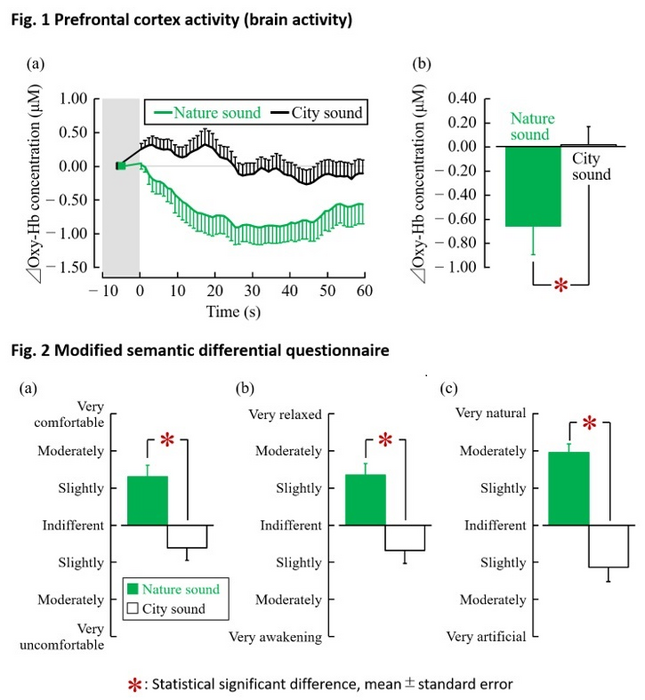Gambling addiction, also called “pathological gambling” and “gambling disorder (GD),” is known to have severe economic, social, mental, and physical consequences on those affected. One of the major factors contributing to the development and relapse of this disorder is stress. However, studies show that replacing gambling with alternative leisure activities may reduce the likelihood of developing the disorder. In recent years, forest bathing, or “shinrin-yoku,” a form of nature therapy, has emerged as an effective and convenient way to alleviate stress. In addition, numerous scientific studies have indicated that exposure to nature can lower stress levels and help the body relax.

Credit: Yoshifumi Miyazaki from Chiba University
Gambling addiction, also called “pathological gambling” and “gambling disorder (GD),” is known to have severe economic, social, mental, and physical consequences on those affected. One of the major factors contributing to the development and relapse of this disorder is stress. However, studies show that replacing gambling with alternative leisure activities may reduce the likelihood of developing the disorder. In recent years, forest bathing, or “shinrin-yoku,” a form of nature therapy, has emerged as an effective and convenient way to alleviate stress. In addition, numerous scientific studies have indicated that exposure to nature can lower stress levels and help the body relax.
In the wake of proposals to introduce commercial casinos in Japan, a research team led by Yoshifumi Miyazaki, Professor Emeritus at the Centre for Environment, Health, and Field Sciences at Chiba University, Japan, sought to explore the potential of nature therapy, particularly insect sounds, in reducing stress responses among individuals with GD. The team aimed to compare the physiological and psychological effects of nature and city sounds on patients with GD. The research team, which comprised Hiroko Ochiai from the Department of Plastic and Reconstructive Surgery, National Hospital Organization Tokyo Medical Center; assistant professor Harumi Ikei and research fellow Hyunju Jo from the Center for Environment, Health and Field Sciences, Chiba University; and Masayuki Ohishi from Ohishi Clinic, Yokohama, Japan, made their study available online on March 27, 2023, and it is all set to be published in the Journal of Integrative and Complementary Medicine.
The study recruited 22 Japanese male participants aged between 25 and 60 years with a diagnosis of pathological gambling based on a total score of 5 or higher on the South Oaks Gambling Screen scale. The participants were randomized into two groups and exposed to either digital nature sounds of insects or traffic sounds at a city intersection, which were presented in a counterbalanced manner. As part of testing the physiological effects of exposure, the autonomic nervous activity of the participants was measured using sensors for heart rate variability, and a near-infrared spectroscopy system was used to measure changes in oxyhemoglobin (oxy-Hb) concentrations in their bilateral prefrontal cortex. Participants’ subjective evaluation was done using the modified version of the semantic differential method questionnaire, and the Profiles of Mood States, second edition (POMS2); this formed part of the psychological effects assessment.
The results of the study strongly indicated that nature-based stimulus exposures induced physiological relaxation and other positive responses among individuals with GD. There was a significant decrease in oxy-Hb concentration in the bilateral prefrontal cortex of participants while listening to nature sounds. Put simply; it made them feel more relaxed and positive. This was corroborated by the low POMS2 negative emotions subscale scores and was attested by improvement in participants’ overall mood, a sense of comfort, and relaxation.
Noting the importance of the study, Prof. Miyazaki says, “It has also been reported that people are spending more time at home and are under stress related to the COVID-19 pandemic. These circumstances strongly point to the need for familiar relaxation methods. The results of this experiment suggest that the auditory stimulation of nature-derived sounds is also beneficial for patients with GD.”
In all fairness, the findings of this study highlight the importance of nature sounds in managing negative emotional states in patients with GD.
“Nature therapy may be useful for stress reduction in various patient groups and the general population, especially as our society becomes more artificialized and stress levels increase. As scientific evidence continues to accumulate, various nature-derived stimuli, including the auditory stimulus used in this study, may contribute to reducing stress in people,” concludes Prof. Miyazaki.
Although further research is needed to explore its long-term implications for individuals with GD, nature-derived sounds could be viable stress-relieving nature therapy for people with serious addictions as well as healthy individuals.
About Professor Yoshifumi Miyazaki
Yoshifumi Miyazaki is a Professor Emeritus from the Centre for Environment, Health and Field Sciences at Chiba University, Japan. He holds a doctorate in medicine from the Tokyo Medical and Dental University. He has published over 200 academic articles and has authored dozens of books on the effects and benefits of nature therapy. In honor of his research efforts, Professor Miyazaki has received awards from the Japanese Ministry of Agriculture, Forestry, and Fisheries & the Japan Society of Physiological Anthropology.
Funding
This study was supported by JKA and received promotion funds from KEIRIN RACE (2020P-224 and 2022P-277).
Reference:
Title of original paper: Relaxation Effect of Nature Sound Exposure on Gambling Disorder Patients: A Crossover Study
Authors: Hiroko Ochiai1*, Harumi Ikei2*, Hyunju Jo2, Masayuki Ohishi3, Yoshifumi Miyazaki2
Affiliations:
- Department of Plastic and Reconstructive Surgery, National Hospital Organization Tokyo Medical Center, Meguro-ku, Japan
- Center for Environment, Health and Field Sciences, Chiba University, Kashiwa, Japan
- Ohishi Clinic, Yokohama, Japan
Journal
Journal of Integrative and Complementary Medicine
DOI
10.1089/jicm.2022.0611
Method of Research
Experimental study
Subject of Research
People
Article Title
Relaxation Effect of Nature Sound Exposure on Gambling Disorder Patients: A Crossover Study
Article Publication Date
27-Mar-2023
COI Statement
The authors declare no conflicts of interest




